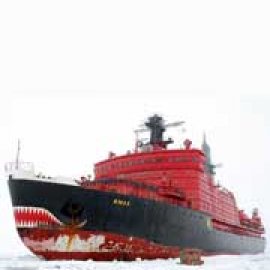Arctic Futures, Part Five: Who Owns The Economic Rights to Arctic Resources?
-
English
-
ListenPause
Welcome to World Ocean Radio… I’m Peter Neill, Director of the World Ocean Observatory. In 1969, the passage of a specially outfitted ice-breaking tanker carrying a single, symbolic barrel of oil from Prudhoe Bay, Alaska, through the Northwest Passage to the Atlantic Ocean, set off a lively dispute between the United States and Canada as to who “owns” that water. Thus began a lively debate focused not so much on the transportation route itself as to what might lie under that water in the form of exploitable resources. Suddenly, national interests were at stake. A similar such debate was generated in the United Nations in 2007 when two Russian mini-submarines planted a rust-proof Russian flag on the seabed below the North Pole near the Lomonosov Ridge which Moscow claimed was directly connected to its continental shelf and established new outer limits beyond 200 miles as a vast area rich with economic potential subject to its territorial possession. Denmark and Canada immediately responded; the Danes asserting that the ridge was an extension of Greenland and the Canadians making a comparable link to its own geology. Scholarly studies ensued, conclusions were justified, maps and documents were submitted, and the 21member UN arbitration panel took the question under advisement. In 2014, Denmark filed its own claim for some 895,000 square kilometers in the region of the ridge, citing evidence of geological movements from the late Paleozoic, Paleocene, and Eocene eras many thousands of years ago that presumably were exclusive enough to preclude the Russians from at least some part of the vast area for claim. There was talk of negotiation and partition, perhaps a dividing of the spoils. However, in August of 2017, the Russians announced that in the next session of the UN Commission on the Limits of the Continental Shelf they would again file a revised bid as a result of changing membership, new appointees who might be persuaded by better arguments. The Russian Minister for the Environment and Natural Resources, was quoted in The Daily Telegraph as saying that the Russians were looking for “recognition of exclusive economic rights to about 460,000 square miles, estimated to hold five billion tons of hitherto unexploited oil and gas.” The Telegraph continued, “Vladimir Putin has described the Arctic as a region of Russian ‘special interest,” and has expanded military presence in the high north to secure it claims in the region. The Russian government plans to spend $2.8 billion pounds on Arctic development between 2015 and 2020.” Meanwhile in the Arctic Council, the conversations continue, genial and general, as if this underlying tension does not exist as an expression of geo-political conflict that can undermine it all. Stay tuned. Sometimes, national aspirations can appear positively absurd. For example, at the Arctic Circle meeting in 2015, Brazil hosted a break-out session to discuss its claim for Arctic involvement. When I asked what was the legal or logical principle on which their argument was based, I was told that “the fish migrate from Brazil water to the Arctic and return, thus they represent a connection by which we justify our claim.” But what if the fish were Arctic? Would that justify an Arctic claim on Brazilian resources, its oil and gas, minerals, and fisheries, for example? I am afraid I asked the follow-up question to no reply. And then there’s China. At the past Arctic Circle meetings in Iceland, the Chinese have arrived in full force with a major policy statement, new research initiatives, aggressive icebreaker construction program, and other insinuated actions that signal that they are players in the future Arctic whether or not they have a territorial claim. This energy and financial investment is intimidating when you realize the limits of other national engagement and the challenge to budgets, particularly in the United States where financing for scientific research, environmental studies, and other Arctic investments are being curtailed. It is amazing to watch how the Chinese presence and American withdrawal have changed the levels of influence in all aspects of the Arctic conversation. When you consider all the time, energy, skill, and funds tied up in these machinations you being to wonder where the true interest lies. The imbalance of investment becomes clear, and that clarity informs the true agenda of all the players, either to expand or defend access they already have and to assure their part of the spoils should all the best intentions fail and the Arctic become an area that no one nation, no international agency, no collective of cooperative interests, or no court of law can protect. We will discuss these issues, and more, in future editions of World Ocean Radio. [outro music]
This week on World Ocean Radio: part five of a multi-part series on the Arctic. In this episode, host Peter Neill discusses the ongoing debate over geological claims to the Arctic and who owns the rights to the natural resources in the vast outer limits of Arctic waters.
About World Ocean Radio
Peter Neill, Director of the World Ocean Observatory and host of World Ocean Radio, provides coverage of a broad spectrum of ocean issues from science and education to advocacy and exemplary projects. World Ocean Radio, a project of the World Ocean Observatory, is a weekly series of five-minute audio essays available for syndicated use at no cost by college and community radio stations worldwide.
Image
Russian nuclear-powered icebreaker YAMAL. Credit: Wikimedia Commons
- Login to post comments



